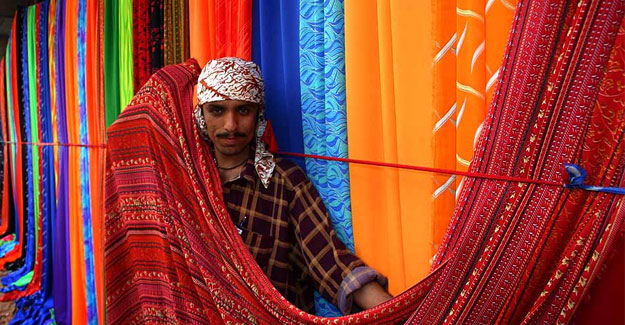
Indian Industry Again Severs Ties With Pakistan
Exporters from the country's largest man-made fabric (MMF) hub in Surat have now stopped exports of fabrics to Pakistan in the aftermath of dastardly attack by a terrorist of Jaish-e-Mohammed (JeM) on a CRPF convoy in Jammu & Kashmir's Pulwama district a few days ago. Over 40 CRPF personnel were martyred in the attack by the terrorist of the Pakistan-based organisation. Two biggest fabric markets in Pakistan- Azam cloth market in Lahore and Lucknow market in Karachi - depend on polyester fabrics, saris, lenghas and dupattas imported from Surat. Many shops in these markets have signboards that say they sell saris and dress material imported from Surat. Southern Gujarat Chamber of Commerce and Industry's (SGCCI) textile committee chairman Devkishan Manghani said, "A delegation from Surat had visited Azam and Lucknow markets in Karachi and Lahore last year. Majority of traders import cheap saris, lenghas and other fabrics from Surat and sell them after value addition. Small traders there will be finished if our exporters don't supply raw material to them." According to media reports, some traders like Gondalia Textile Exports, who used to export fabrics worth Rs 4 crore per annum to Pakistan, have now severed business links with Pakistani traders. Sudarshan Textiles, which was supplying Rs 10 crore worth of fabrics, too has winded up its Karachi office, While some MMF traders are severing ties with Pakistan, Indian cotton exporters have adopted a wait-and-watch policy. And believe the slump in trade is only temporary, even as China is buying more Indian cotton. MFN status to Pakistan withdrawn The Indian government has announced the withdrawal of the Most Favoured Nation (MFN) status to Pakistan. At present, India's imports from Pakistan are around a quarter of its exports to Pakistan. India can now increase customs duties on Pakistani goods. However, the very small volume of trade between the two countries would not have much impact. It is a known fact that the unofficial trade between the two countries is probably five times that of the official trade figures. The latest spate of events has led to various textile groups declaring that business ties with Pakistan should end. Various textile companies have severed ties with Pakistani traders. The question that arises is - why does talk about severing business ties with Pakistan take centre stage only when the media headlines the warlike situation that prevails across the borders with Pakistan? How is this situation, and the casualties suffered, ignored when news about border skirmishes is relegated to the 19th minute of a 30 minute news capsule? And why does trade resume when the dust settles, given that official trade between the two countries is anyway negligible, and relations with Pakistan almost always uncertain? In 2017, 83 security force personnel and 57 civilians suffered casualties in Jammu & Kashmir. In 2018, 95 security force personnel, and 86 civilians suffered casualties. In 2019, till February 24, 2019, 51 security force personnel, and 3 civilians lost their lives in the region. Is it an achievement for textile export promotion councils and textile exporters when Pakistan becomes the largest market for Indian manmade textiles momentarily? Is it a success of India's textile export policy and exporters' strategies that Indian cotton makes up almost 30% of its total exports to Pakistan? India's exports of manmade staple fibres and filament yarn textiles to Pakistan account for around 2-2.5% of India's total exports of the two products to the world. Assuming there are not more than 40 exporters of the product to Pakistan, that would mean an average business of around Rs 20-25 crore from Pakistan, per trader. Given that Indian consumption of the commodity is on the rise, apparel consumption is increasing as the retail sector grows, it would apparently appear easier to supply in the domestic market. Now let's look at cotton textiles, which accounts for almost 30% of India's exports to Pakistan. A major portion of this is made up of cotton fibre exports. Exports to Pakistan are a little over 7% of India's total cotton and cotton textile exports to the world. The Indian cotton market, every season witnesses speculations, hoardings, for better prices. The 7% of cotton exported to Pakistan, if diverted to the domestic market, would bring a little more stability in the Indian market.
Textile Excellence
If you wish to Subscribe to Textile Excellence Print Edition, kindly fill in the below form and we shall get back to you with details.












